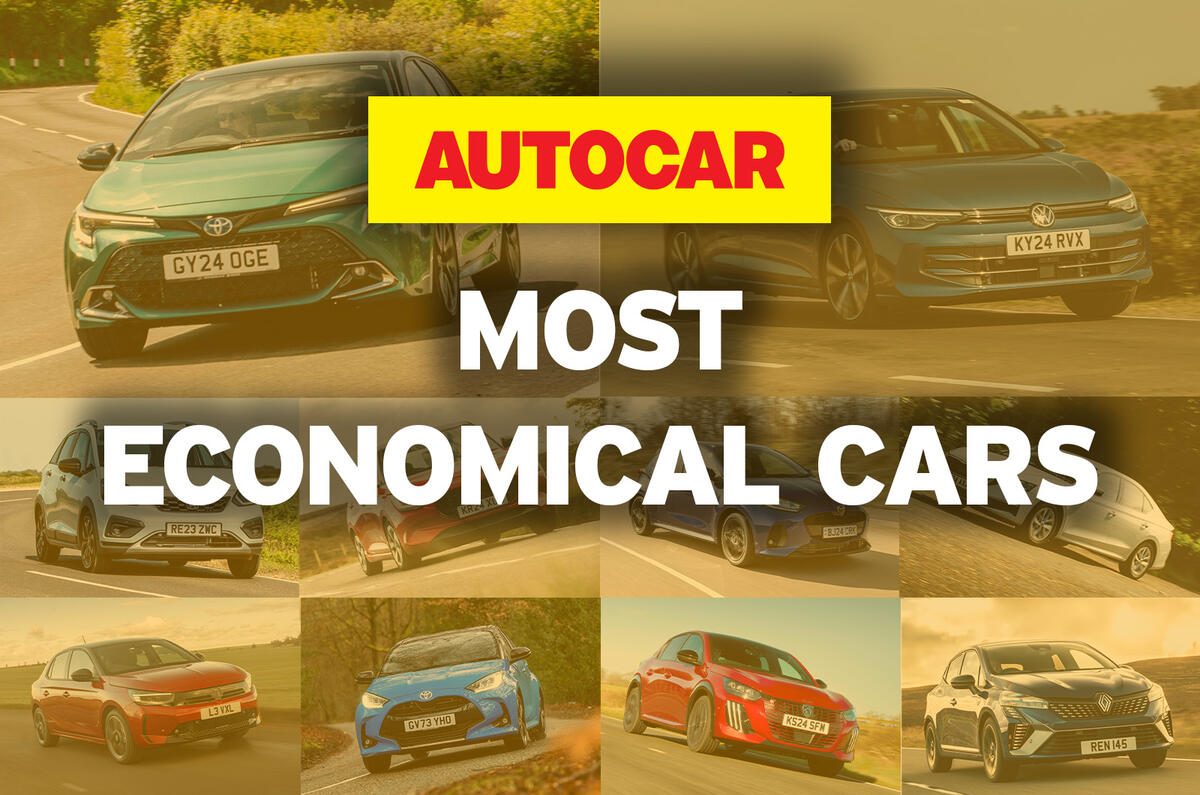The cars with the best MPG – and their real-world efficiency revealed
Looking to save some pennies? These are the most economical cars on sale today – tested in the real world

News
by Jack Warrick
6 mins read
27 July 2025
Share
Finding a car that sips fuel rather than guzzles it has long been a top priority for many drivers, but it seems it’s more important than ever to make your money – and fuel – stretch as far as possible.
With fluctuating fuel prices and increasing environmental awareness, the appeal of a highly economical car is at an all-time high – but with so many models on the market, how do you pinpoint the ones that truly excel in fuel efficiency?
It’s one thing to read the official miles-per-gallon (MPG) figures published by manufacturers, but these numbers are often achieved in ideal conditions and not easily replicated in the real world.
To help you make a more informed decision, we’ve compiled a list of all the most economical cars on sale today. To see if they’re up to snuff, we’ve also included our own economy results for each model – with some surprising results.
This list includes petrol, diesel, mild-hybrid and full-hybrid models. We’ve excluded plug-in hybrid cars here, because their officially advertised economy figures are often highly unrealistic and rely on large, charged-up batteries.
We’ve also excluded fully-electric models here, but you can see our list of the longest-range electric cars, plus our compilation of the most efficient electric cars and their real-world results. The top pick based on official figures is the frugal Mazda 2, but you’ll have to read on to see what it actually scored in the real world.
So whether you’re a daily commuter, a budget-conscious buyer or simply looking to reduce your carbon footprint, these vehicles represent some of the best choices available for maximising your miles per gallon.
1. Mazda 2
7
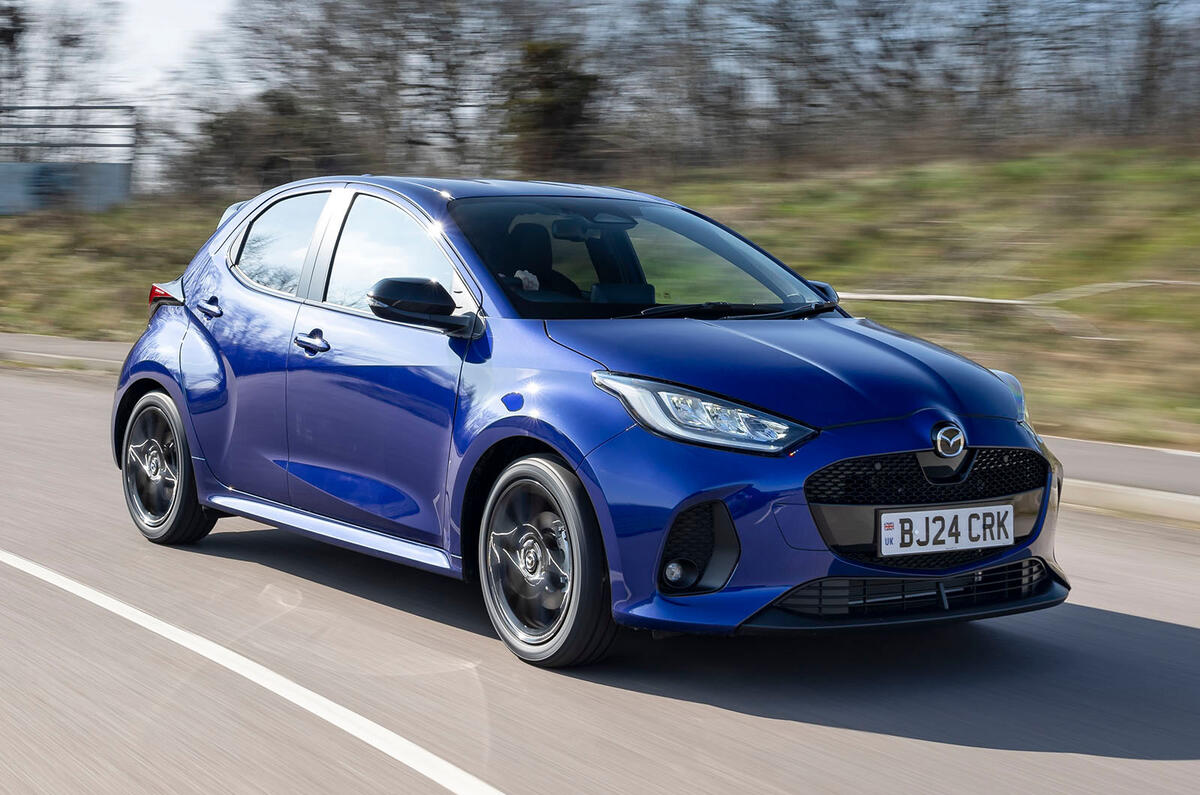
- Design7
- Interior8
- Performance6
- Ride & Handling8
- Costs8
Pros
Efficient powertrain makes for reasonable running costs
Surprisingly sharp handling and fun on the right roads
Toyota engineering mixes well with Mazda design cues
Cons
The Toyota Yaris is basically the same car and is a bit cheaper
Other cars in this class are better to drive
Claimed economy: 74.3mpg
Our economy: 60.3mpg
It’s likeable, efficient and honest, with enough of a dash of dynamic fun that it can hold its head up in the shrinking but still competitive supermini ranks
The Mazda 2 is sold as one of the most economical cars on sale today, with a remarkable advertised economy figure of 74.3mpg.
You might be thinking that this small Japanese hatchback looks familiar, and you’d be correct. The Mazda 2 is in effect a rebadged Toyota Yaris, sharing most of its underpinnings and, crucially, its hybrid technology.
It isn’t a straight copy and paste, though. While the Yaris offers a choice of electrified engines ranging up to 129bhp, the Mazda 2 has just one: a 114bhp, three-cylinder 1.5-litre petrol unit, which will hit 0-62mph in 9.2sec.
Our extensive drive in the Mazda 2 returned 60.3mpg, which is very respectable indeed, if not quite as high as Mazda advertises.
Read our Mazda 2 review
Save money on a new Mazda 2 with What Car?
Latest Reviews

Fiat 500e
6

Nissan Ariya Nismo
6

Suzuki Swift
8

BMW M3 CS Touring review
8

Used BMW X1 2015-2021 review
8
Read our review
Car review

Mazda 2 Hybrid
When is a Mazda 2 not a Mazda 2? When it’s a Mazda 2 Hybrid…
Back to top
2. Toyota Yaris
8
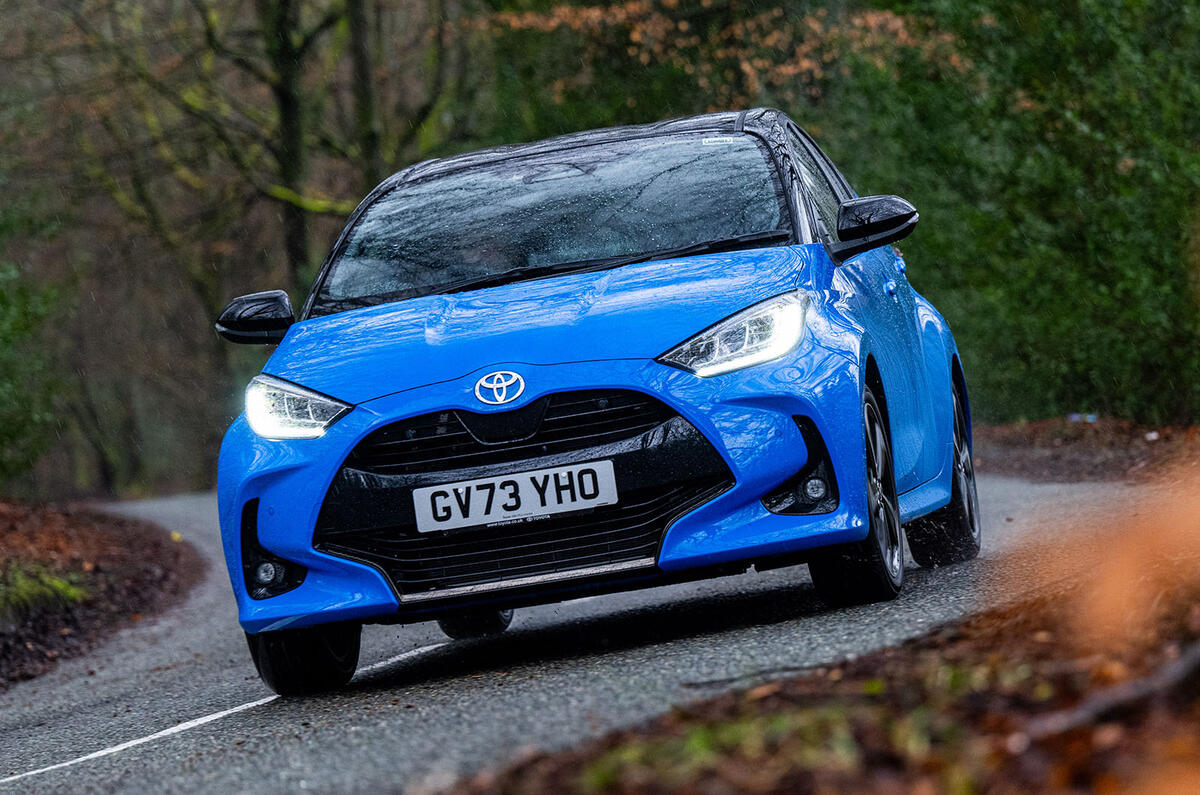
- Design7
- Interior8
- Performance6
- Ride & Handling8
- Costs9
Pros
Excellent manners around town, where it’s brisk but calming
Hardly scintillating to drive but dynamically very well sorted
Great economy
Cons
Frugal powertrain still offers very little for the keen B-road driver
Second-row passenger and boot space comes up short next to rivals
Claimed economy: 70.6mpg
Our economy: 62.3mpg
If you’re after more than just efficiency from your urban runabout, it’s likely you’ll need a Yaris in either Design or Excel specification
Efficiency has always been the key mantra of the Toyota Yaris, and to this day it is a bell-ringer for low running costs.
Toyota itself claims an economy figure of 70.6mpg, which differs from the mechanically similar Mazda 2 due to specification changes, such as larger wheels.
You’ll see a lot of those economical benefits in town, where Toyota claims the small hatchback can run on electric power for 80% of the time when travelling at low speeds.
Regardless of how you drive, you’re unlikely to see south of 50mpg. Our tests returned an impressive 62.3mpg in the lower-powered, 115bhp engine, while the more potent 129bhp car produced 56.3mpg.
Read our Toyota Yaris review
Save money on a new Toyota Yaris with What Car?
3. Renault Clio
9
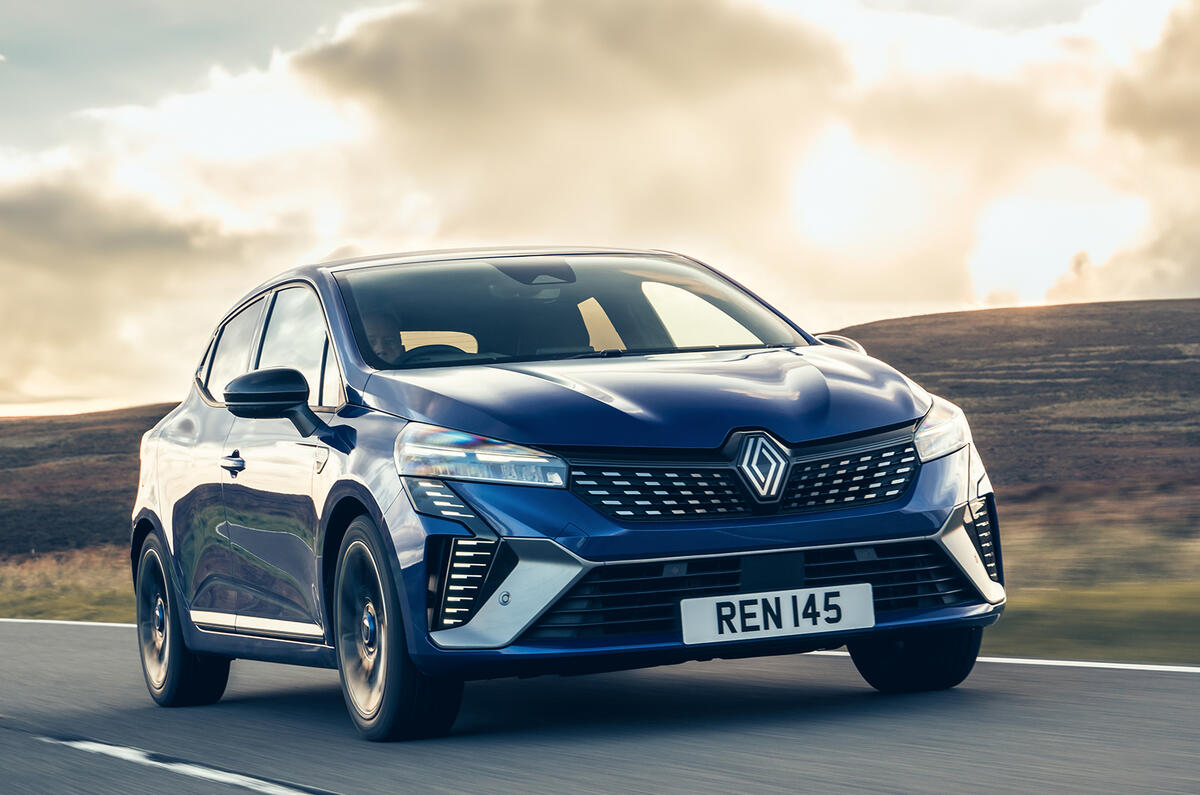
- Design9
- Interior7
- Performance7
- Ride & Handling8
- Costs9
Pros
In the hybrid, seamless switch between electric and combustion power
Well equipped, even on lower trim levels
New interior mostly looks and feels as good as anything in the class
Cons
More agile, assertive handling comes at the cost of a supple ride
Adults and older children won’t like it in the back seats
Heavier acceleration prompts a harsh growl from the 1.6-litre petrol engine
Claimed economy: 67.3mpg
Our economy: 59.4mpg
A welcome part of the facelift is a return for the six-speed manual gearbox in place of the five-speeder Renault offered before this round of revisions
Possibly the best small car on this list to drive every day, the Renault Clio is also one of the most economical on sale in the UK today.
Two engines are available: a 1.0-litre three-cylinder petrol engine (badged TCe 90) and the full hybrid E-Tech.
Both offer impressive levels of frugality, with the pure petrol car claiming 54.3mpg and the full hybrid 67mpg. Should you opt for the E-Tech, you’ll also get 143bhp and 106lb ft, with a 0-62mph time of 9.3sec.
Our real-world tests returned 59.4mpg with this powertrain, while the TCe 90 resulted in routine scores over 50mpg.
More impressive still is the Clio’s price point, starting at £18,995 for the petrol and £21,895 for the hybrid, making it one of the cheapest electric cars on sale.
Read our Renault Clio review
Save money on a new Renault Clio with What Car?
Back to top
4. Peugeot 208
7
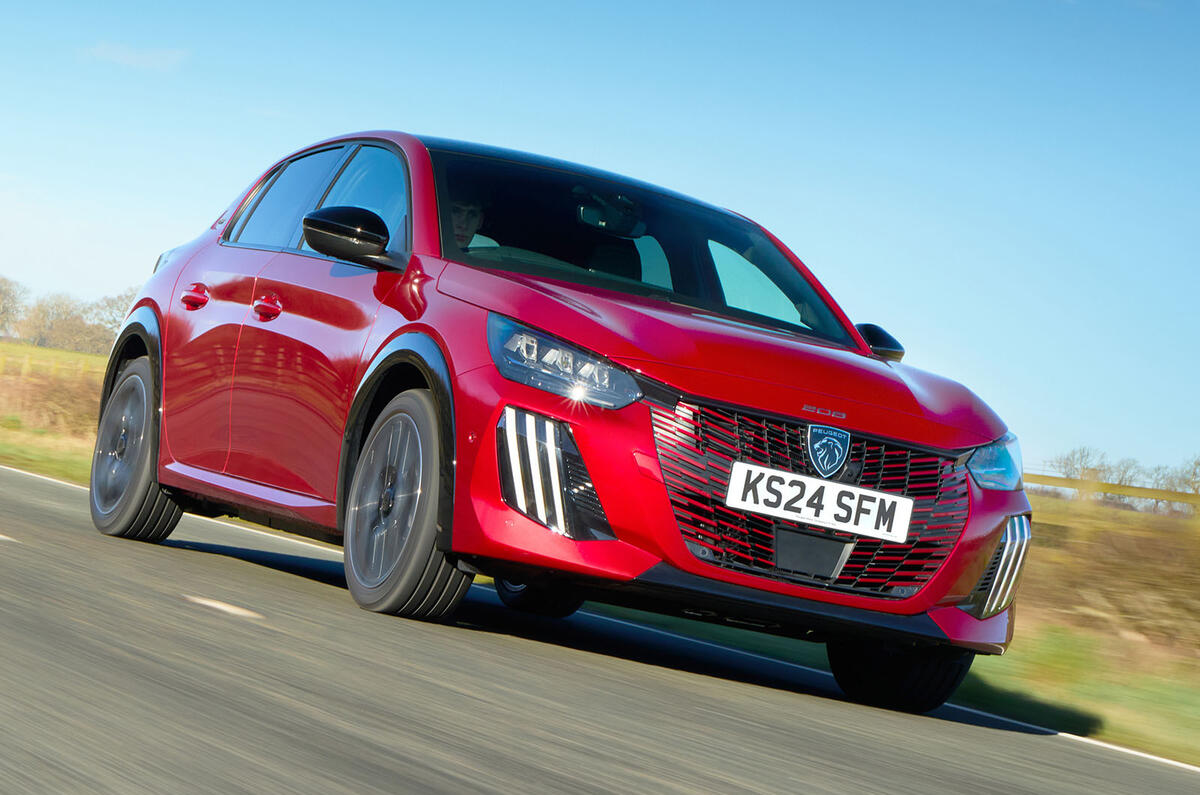
- Design9
- Interior4
- Performance7
- Ride & Handling6
- Costs7
Pros
Looks great
Easy and relatively fun to drive
High-quality finish for a supermini
Cons
Multiple excellent rivals
Tricky seating position for some
You have to control the temperature on the touchscreen
Claimed economy: 65.9mpg
Our economy: N/A
Excellent looks, a premium finish, high equipment levels and good, easy fun behind the wheel all make this one to consider.
The Peugeot 208 is billed as the most efficient car to come from the Stellantis stable, with a claimed economy of 65.9mpg in its most penny-pinching set-up.
Three engine options are available, including two mild hybrids ranging from 99bhp to 134bhp. There’s a regular turbocharged petrol engine too, while the e-208 takes care of those after a fully electric model.
According to Peugeot, the most efficient model is the 208 Hybrid 110. The standard petrol is still a good choice for economy, though, with a claimed figure of 58.2mpg.
Our tests in the standard petrol didn’t live up to Peugeot’s claim: we hit 47.9mpg. We’re yet to properly test the hybrid on an in-depth economy run, but we anticipate the results to be far superior to the standard petrol.
Read our Peugeot 208 review
Save money on a new Peugeot 208 with What Car?
5. Volkswagen Golf
9
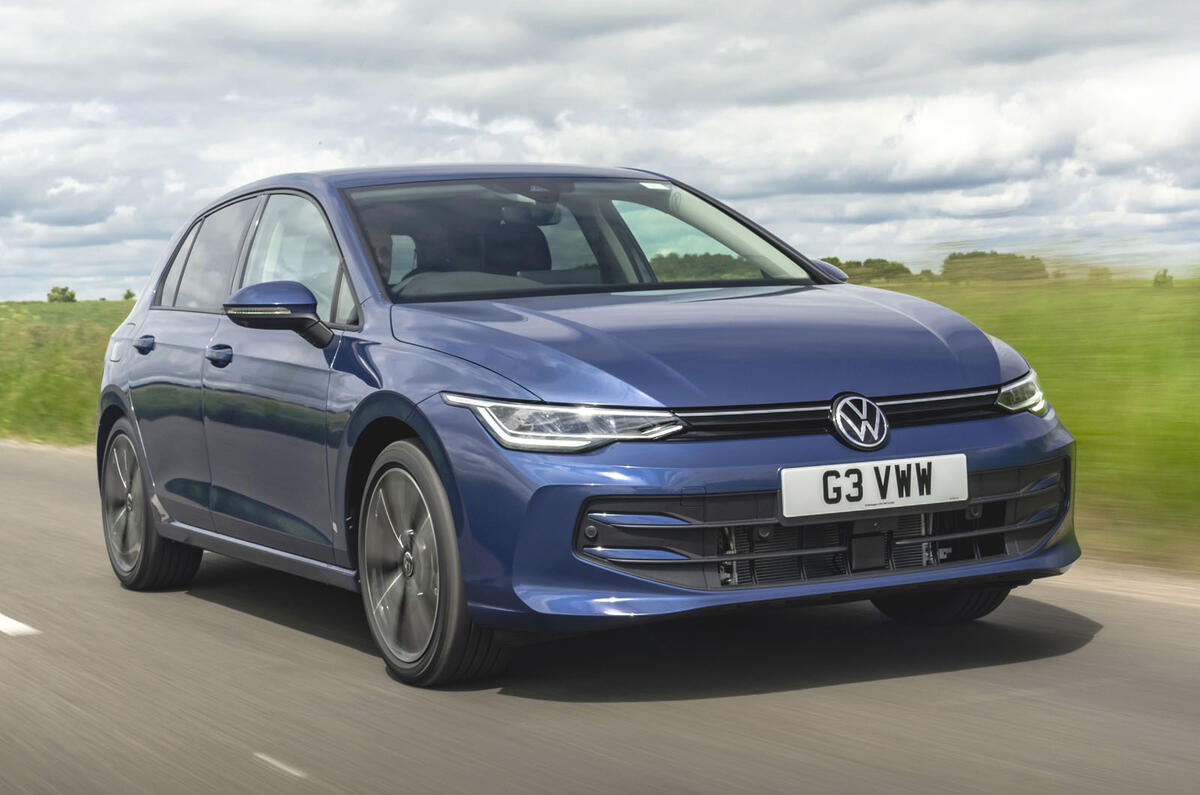
- Design8
- Interior8
- Performance8
- Ride & Handling9
- Costs8
Pros
Excellent refinement, drivability and efficiency
Wonderfully rounded driving manners and, on adaptive dampers, a comfortable ride
Updated multimedia is a huge step forward
Cons
Mk8 look is a little fussy and derivative for some
Somewhat expensive
Some remaining doubts about the tech’s reliability
Claimed economy: 64.6mpg
Our economy: 60.3mpg
The Golf’s diesel efficiency is unmatched in any other kind of powertrain and should still be seriously considered by anyone doing lots of motorway miles.
The venerable Volkswagen Golf has several powertrains capable of remarkable economy figures, ranging from pure petrol to plug-in hybrids with 88 miles of electric range.
Away from plug-in hybrids, though, the two best picks for economy are the 150PS eTSI mild-hybrid or the now old-school 2.0 TDI.
Both throw up some seriously impressive figures. When we roadtested the eTSI mild-hybrid, the Golf returned a figure of 60.0mpg, and the 2.0 TDI inched ahead of it with 60.3mpg.
Both considered motorway miles and some more throttle-heavy B-road driving, and ultimately shows the Golf is still close to the top of the class for commuting.
Read our Volkswagen Golf review
Save money on a new Volkswagen Golf with What Car?
Back to top
6. Skoda Octavia
8
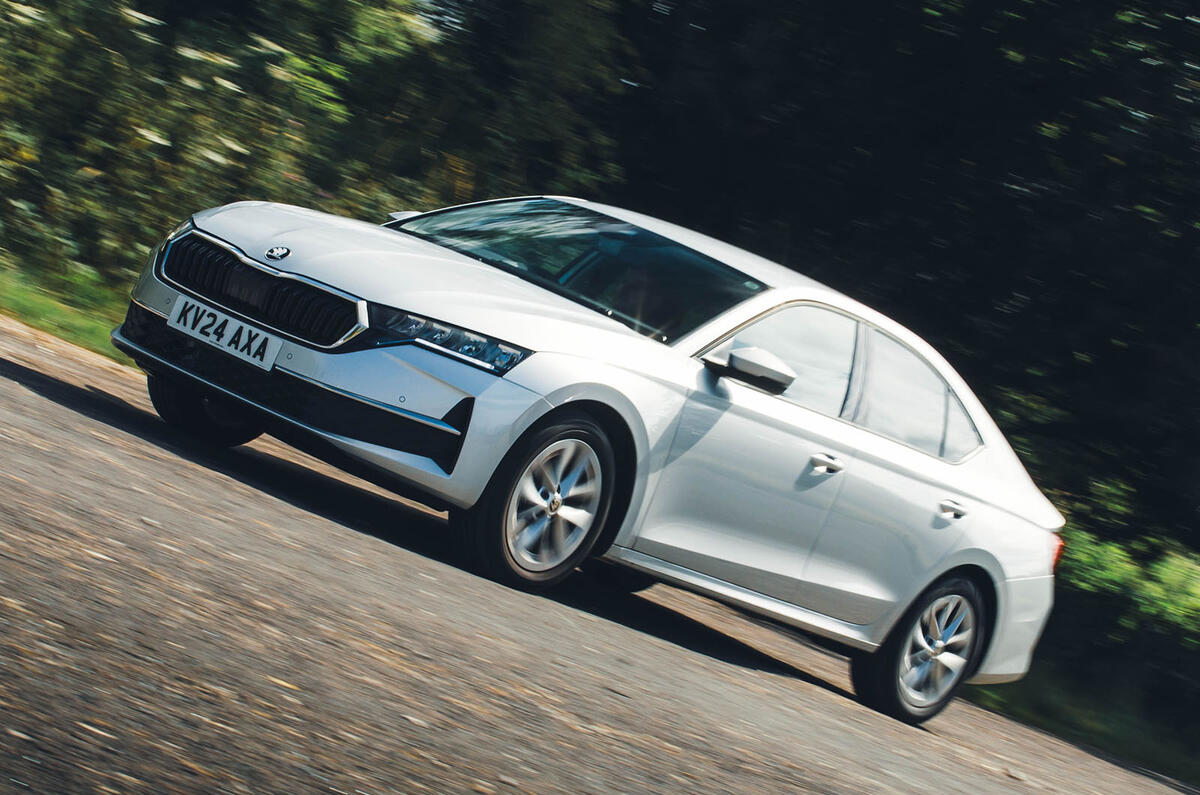
- Design9
- Interior8
- Performance8
- Ride & Handling8
- Costs9
Pros
Hugely practical and spacious
Pleasant, comfortable on-road demeanour
Economical engines
Cons
Not a particularly dynamic drive
Iffy build quality in places
Looks more like a generic saloon than it ever has
Claimed economy: 64.2mpg
Our economy: 60mpg
It’s as easy to drive as it is to get comfortable in. It has massive boot space and even its entry-level engine doesn’t feel underpowered.
The largest car on this list, the Skoda Octavia, offers a similar powertrain selection to the Volkswagen Golf.
Its most impressive economy figure is offered by the same 2.0 TDI we enjoyed in the Golf but with a claimed figure of 64.2mpg.
Our tests returned a frugal 60mpg, making the Octavia perfect for motorway driving. It’s a genuienly long-range warrior, and you’d likely get around 500 miles out of a single tank of fuel.
You should also consider the 1.5 mild-hybrid, however. Like the Golf, you could likely see above 70mpg in the right conditions, meaning additional savings.
Read our Skoda Octavia review
Save money on a new Skoda Octavia with What Car?
7. Suzuki Swift
8
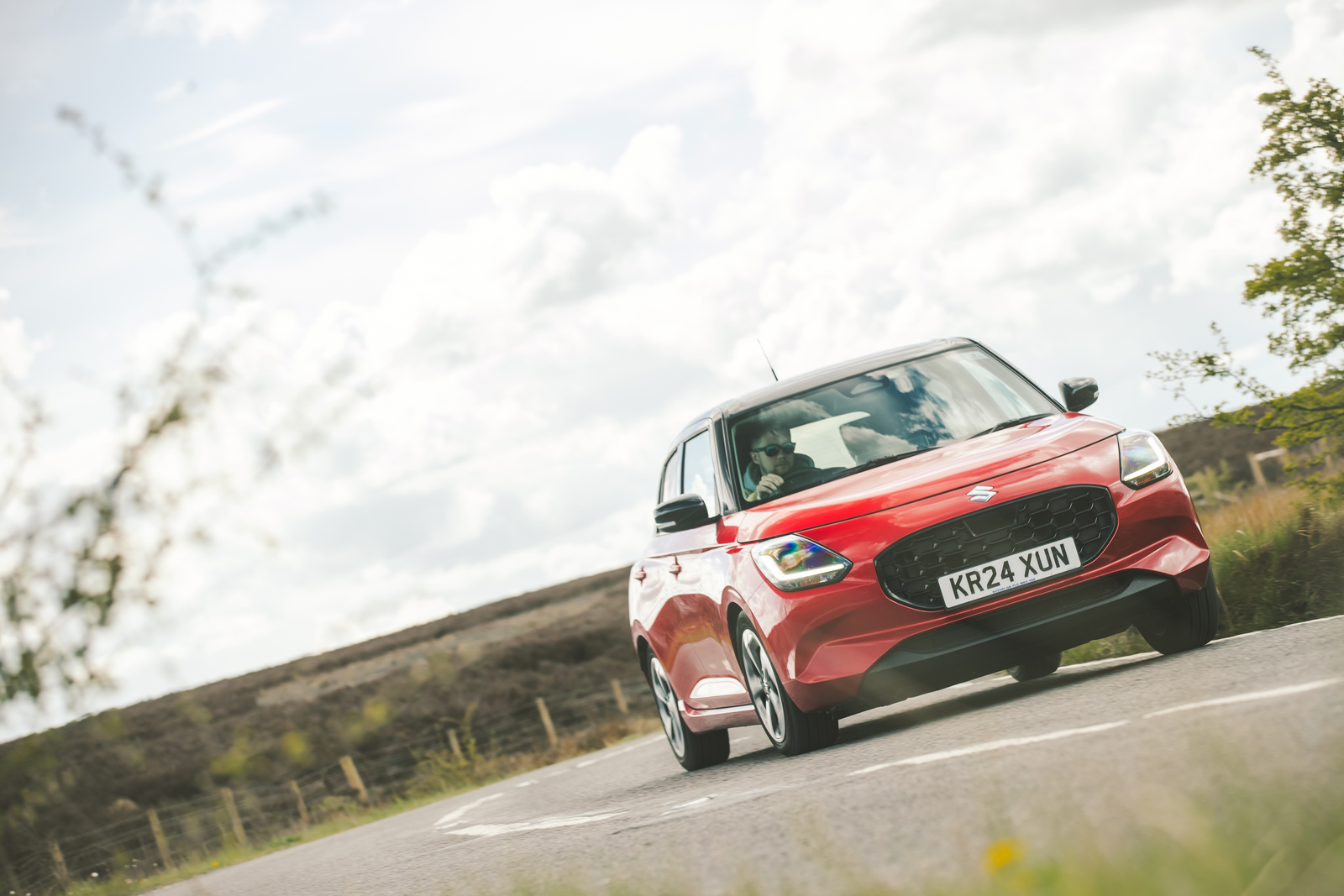
- Design8
- Interior7
- Performance7
- Ride & Handling8
- Costs8
Pros
Light and compact dimensions make it a doddle to drive in town
Nicely engaging drive for something of its price
Well-equipped, easy-to-use cabin
Cons
Fidgety ride
ADAS deactivation is frustratingly overcomplicated
Spongy brakes
Claimed economy: 64.2mpg
Our economy: 60.3mpg
When the Swift is fitted with the CVT, Suzuki claims 58.8mpg and 108g/km of CO2.
The Suzuki Swift is a small car with bags of character, owing to its involving chassis, energetic handling and enjoyable manual gearbox.
Another reason it’s worth considering is its economical powertrain, of which there is a sole option: a 1.2-litre naturally aspirated three-cylinder engine with mild-hybrid assistance.
Suzuki claims it’s 7% more efficient than the engine it replaced, achieving an official figure of 64.2mpg when selected with a manual gearbox.
Best of all, we found this figure to be absolutely achievable in the real world, hitting an average of 60.3mpg in our roadtest.
Read our Suzuki Swift review
Save money on a new Suzuki Swift with What Car?
Back to top
8. Toyota Corolla
9
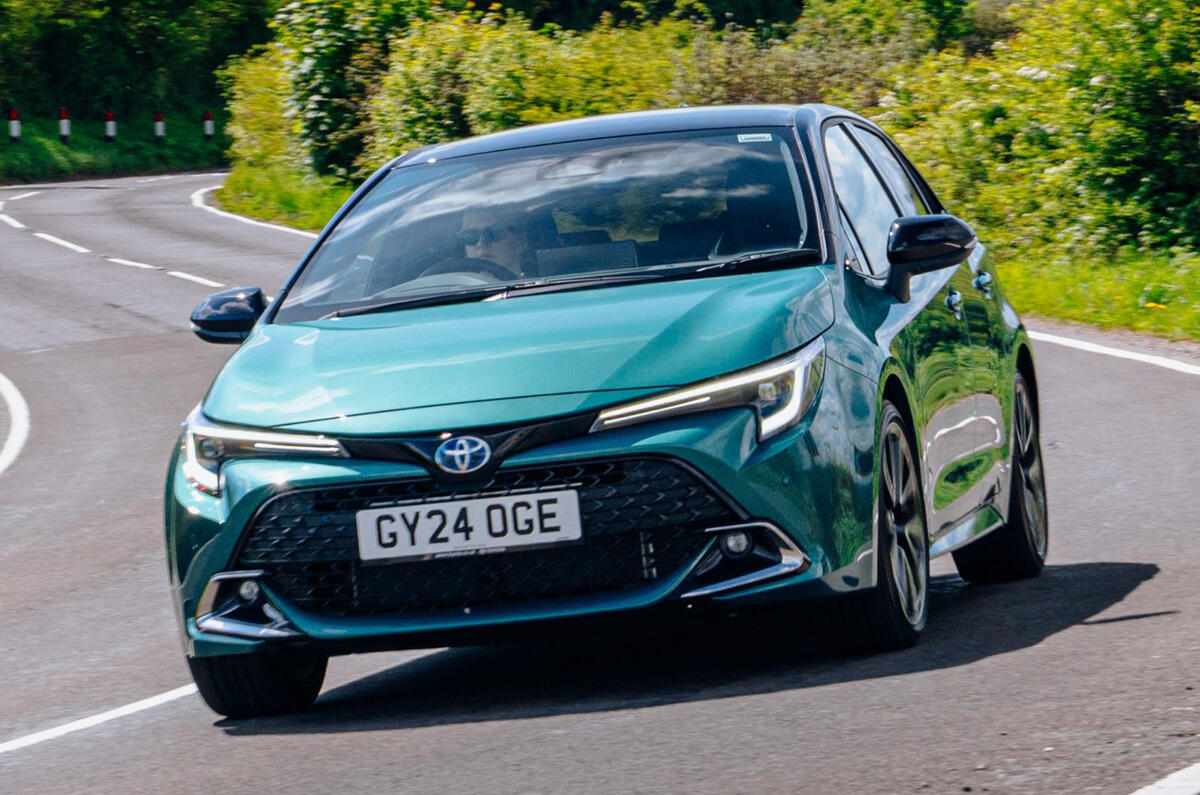
- Design8
- Interior7
- Performance8
- Ride & Handling10
- Costs9
Pros
Comfortable, easy-to-use interior
Ride-handling balance is spot on for a family hatch
Design is stylish and modern yet inoffensive
Cons
Interior and multimedia look and feel somewhat dated
Not especially roomy compared with rivals
CVT gearbox can make engine noise intrusive
Claimed economy: 62.4mpg
Our economy: 60mpg
There’s an ‘EV’ button, but the car’s pure-electric capabilities are so limited that you’re much better off just letting the computers decide.
It’s no surprise to see the Toyota Corolla on a list of the most economical cars on sale. The Japanese rival to the Volkswagen Golf is a byword for economy and efficiency in the industry.
Toyota claims an outstanding 62.4mpg from its entry-level 1.8-litre hybrid engine, and 62.7mpg in the more powerful 2.0-litre car.
Our long-term test of the Corolla which used a 1.8-litre variant, returned a figure of 60mpg, but in some instances our tester even hit as high as 72.6mpg.
We’ve used our average figure here to illustrate the Corolla’s day-to-day economy, but we reckon those low-70 figures will be achievable on a regular basis.
Read our Toyota Corolla review
Save money on a new Toyota Corolla with What Car?
9. Honda Jazz
7
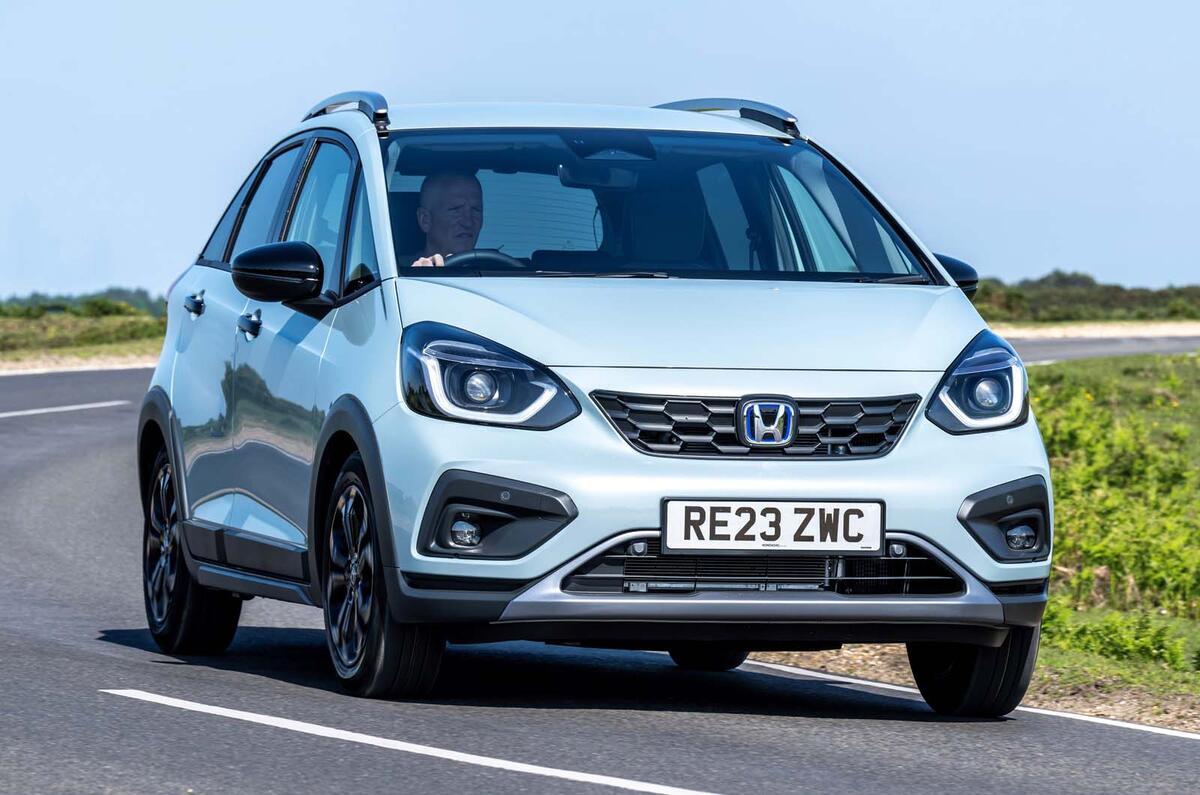
- Design8
- Interior9
- Performance6
- Ride & Handling7
- Costs7
Pros
Fuel economy is exceptional, even without trying
Interior practicality is easily up there with the best in class
Cons
Remains a fairly bland, if secure, device to drive
Doesn’t do much to shake its slightly dull image
Official economy: 62.8mpg
Our economy: 56mpg
In many respects, the Jazz feels like an EV to drive, with performance delivered in a smooth and progressive manner.
The Honda Jazz is another economical option in the real world, complete with an EV-only mode and some enticing numbers on paper.
Power comes from an e:HEV full hybrid system, which combines a 1.5-litre petrol engine with a battery and two electric motors to produce 120bhp and 187lb ft.
Honda quotes a figure of 62.8mpg, but our tests returned slightly less economical 56mpg. Still, impressive nonetheless. It’s not far off the Toyota Yaris, and the Honda actually comes closer to hitting its claimed figure.
Rivals like the Yaris and the Clio might save you more in the long run, though, when you consider the Jazz’s significantly higher list price, which starts at around £28,000.
Read our Honda Jazz review
Save money on a new Honda Jazz with What Car?
Back to top
10. Vauxhall Corsa
7
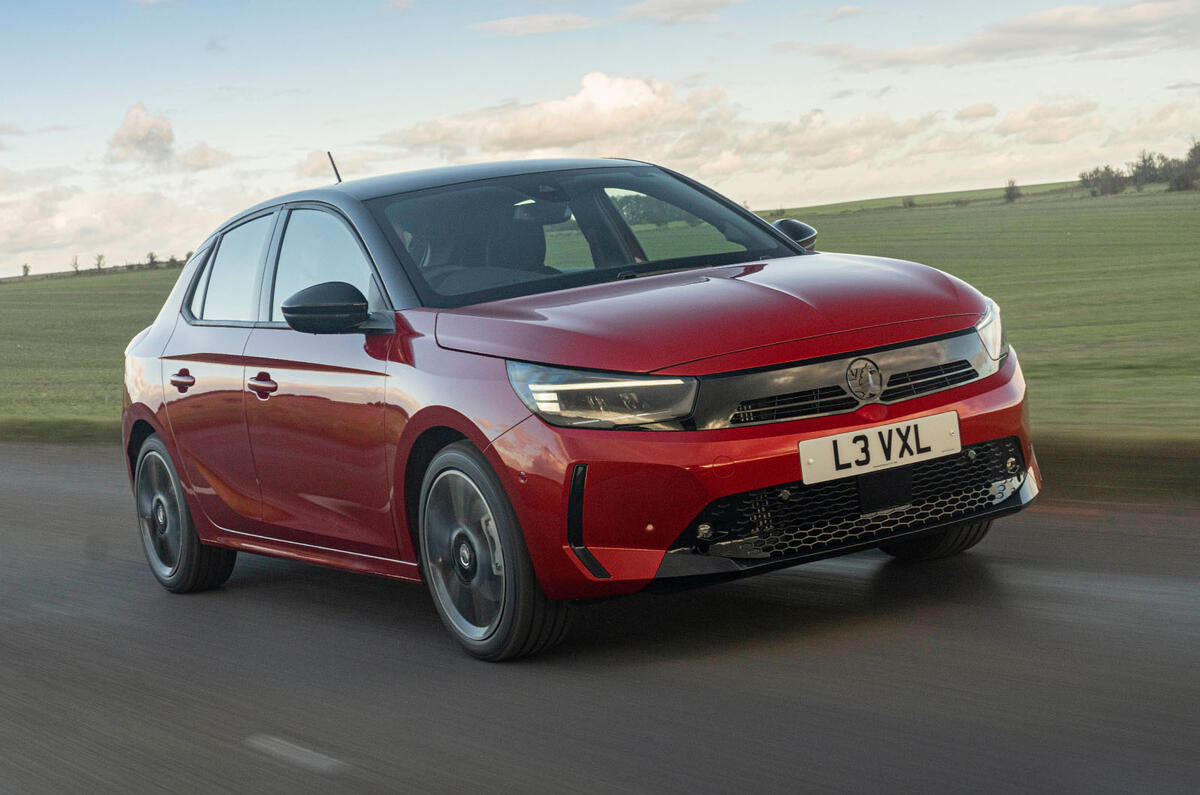
- Design8
- Interior6
- Performance7
- Ride & Handling7
- Costs8
Pros
Less dumpy, functional design boosts visual allure
Torquey, keen, decently economical engines
Richer-seeming interior with better on-board technology
Cons
Remote if competent, slightly unengaging handling
Ride can be firm, restive and a little wooden-feeling
Second-row cabin space has gone backwards
Claimed economy: 61.4mpg
Our economy: 58.7mpg
Our peak MPG reading was 50.1mpg, but our lowest was only 47.8mpg, so fuel consumption was at least consistent. Either way, 400 miles out of a tank was easily doable.
Vauxhall’s alternative to the Peugeot 208 is the Vauxhall Corsa, with which it shares its underpinnings and its hybrid engine.
The result is another frugal supermini with lots of potential to boost your daily economy, with a claimed figure of 61.4mpg when using the 1.2-litre hybrid engine.
Our tests in the entry-level 1.2-litre turbocharged petrol car, equipped with the manual gearbox, returned 51.8mpg. Our long-term test in the hybrid produced an even more impressive 57.8mpg.
Importantly, the Vauxhall was consistently economical over our long-term test, meaning it should be ideal to live with day to day.



